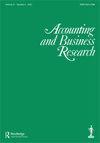关于“采用IFRS 11对会计信息可比性的影响”的讨论
IF 1.4
4区 管理学
Q2 BUSINESS, FINANCE
引用次数: 2
摘要
会计信息的可比性使该信息的用户能够发现和理解财务报告中所述事件和安排的相似性和差异性。可比性既是国际会计准则理事会(IASB)制定标准目标的一个组成部分,也是IASB概念框架中有用财务信息的一个增强质量特征。关于作为标准制定目标的可比性,《国际财务报告准则序言》(第6(a)段)指出,国际会计准则理事会的目标是“制定。。。单套高品质。。。全球公认的财务报告标准。。。需要在财务报表中提供高质量、透明和可比的信息……”目标表明,其应用产生可比信息的标准应在全球范围内履行这一职能,即在任何要求或允许使用国际会计准则理事会标准的司法管辖区内。关于可比性作为有用会计信息的一个定性特征,国际会计准则理事会的财务报告概念框架(“框架”)将可比性定义为报告信息的一种属性,“使用户能够识别和理解项目中的相似性和差异性”(国际会计准则委员会2018,第QC21段)。实现可比性的一个条件是“相似的东西必须看起来相似,不同的东西必须看上去不同”(IASB 2018,第QC 23段)。换言之,类似项目的相似核算和不同项目的不同核算是实现可比财务报告信息的渠道或机制,这一特征应与报告发生的司法管辖区保持不变。本文章由计算机程序翻译,如有差异,请以英文原文为准。
Discussion of ‘The impact of the adoption of IFRS 11 on the comparability of accounting information’
Comparability of accounting information allows users of that information to detect and understand similarities and differences in the events and arrangements depicted in financial reports. Comparability is both a component of the International Accounting Standards Board’s (IASB) standard-setting objectives and an enhancing qualitative characteristic of useful financial information in the IASB’s conceptual framework. With respect to comparability as a standard-setting objective, the Preface to International Financial Reporting Standards (para. 6(a)) states that the IASB’s objective is ‘to develop... a single set of high quality... globally accepted financial reporting standards... [that] require high quality, transparent and comparable information in financial statements... .’ The objective indicates that the standards whose application produces comparable information should perform this function globally, that is, in any jurisdiction that requires or permits the use of the IASB’s standards. With respect to comparability as a qualitative characteristic of useful accounting information, the IASB’s Conceptual Framework for Financial Reporting (the Framework) defines comparability as a property of reported information that ‘enables users to identify and understand similarities in, and differences among, items’ (IASB 2018, para. QC21). A condition for achieving comparability is that ‘like things must look alike and different things must look different’ (IASB 2018, para. QC 23). Put another way, similar accounting for similar items and different accounting for different items is the channel or mechanism for achieving comparable financial reporting information, and this feature should be invariant to the jurisdiction in which the reporting occurs.
求助全文
通过发布文献求助,成功后即可免费获取论文全文。
去求助
来源期刊

Accounting and Business Research
BUSINESS, FINANCE-
CiteScore
3.40
自引率
11.80%
发文量
38
期刊介绍:
Accounting and Business Research publishes papers containing a substantial and original contribution to knowledge. Papers may cover any area of accounting, broadly defined and including corporate governance, auditing and taxation. However the focus must be accounting, rather than (corporate) finance or general management. Authors may take a theoretical or an empirical approach, using either quantitative or qualitative methods. They may aim to contribute to developing and understanding the role of accounting in business. Papers should be rigorous but also written in a way that makes them intelligible to a wide range of academics and, where appropriate, practitioners.
 求助内容:
求助内容: 应助结果提醒方式:
应助结果提醒方式:


